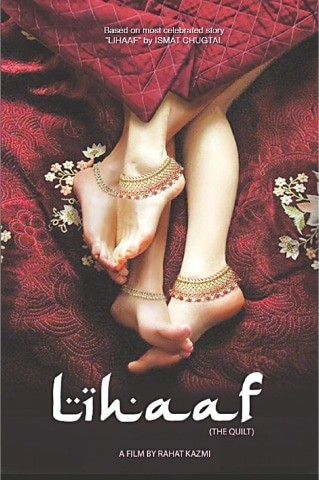Zoovia Hamiduddin in Dawn:
 A picture is worth a thousand words. In the case of Indian filmmaker (not to be confused with the Pakistani actor) Rahat Kazmi’s 2018 film Lihaaf: The Quilt, based on Ismat Chughtai’s controversial short story of the same name, the production’s publicity poster says perhaps more than a thousand words.
A picture is worth a thousand words. In the case of Indian filmmaker (not to be confused with the Pakistani actor) Rahat Kazmi’s 2018 film Lihaaf: The Quilt, based on Ismat Chughtai’s controversial short story of the same name, the production’s publicity poster says perhaps more than a thousand words.
Kazmi’s Lihaaf has little bearing to Chughtai’s story. The intensely sexualised poster shows two sets of fair and lovely feet, adorned with paazeb [anklets], languidly intertwined. A very titillating, sensual, consensual and egalitarian image — you can’t tell which feet belong to the whiter-than-white mistress and which to the very dark maid. The poster brims with confidence and choice; a loud, proud statement about LGBTQ’s arrival on the Indian cinema screen. The plush, ruby red quilt on which the feet are presented may be Kazmi’s Lihaaf, but it is certainly not ‘Lady Changez’s’ quilt.
Chughtai, a card-carrying communist and proud early member of the Progressive Writers’ Association, would have been horrified at such a bourgeoisie representation of her writing. When she wrote Lihaaf, Chughtai was an unmarried, 20-something influenced by the likes of John Paul Sartre, Simone de Beauvoir, George Bernard Shaw, D.H. Lawrence and his inflammatory Lady Chatterley’s Lover and, most importantly, Rashid Jehan, who “fuelled my rebelliousness. She explained to me that what is considered impolitic and rude in society is often the truth; she became my inspiration.”
More here.
